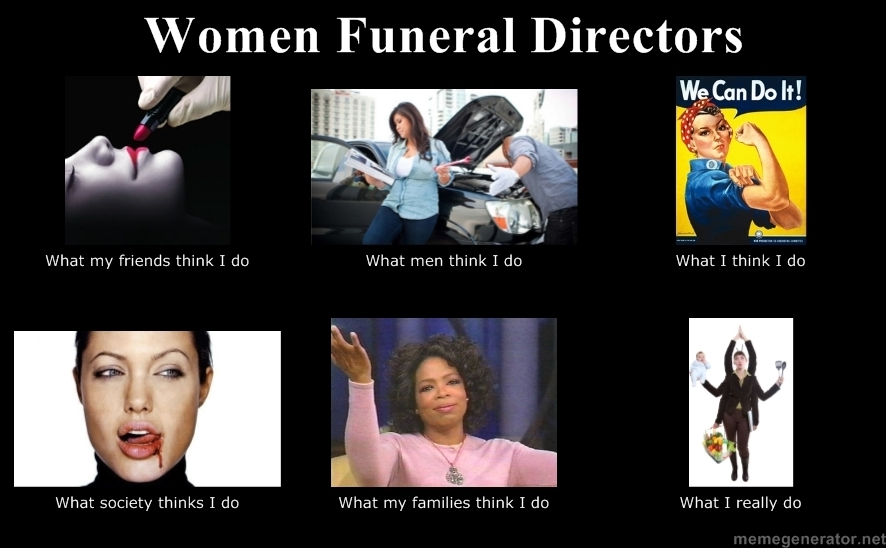Top 10 Worst Jobs List Includes Funeral Director and Embalmer, Again
Are you happy with your job? Think you are underpaid and overworked? Are you laboring under Industrial Revolution-era working conditions?
If you have a steady job, you should be thankful. Many people aren’t so lucky. But then there are others whose jobs, for one reason or another, are jobs we likely wouldn’t want, because they pay poorly, are too dangerous or evoke the gag reflex.
With that as the backdrop, we asked readers via an informal Survey Monkey poll which of 20 jobs choices we listed they would be least willing to take — even if they were unemployed, had little money in the bank and no food in the fridge.
The options were: chimney sweep, corrections officer, firefighter, substitute teacher, fast food cook, utility lineman, Walmart package checker, security guard, maggot farmer, proctologist, police officer, embalmer, portable toilet cleaner, skyscraper window washer, enlisted soldier, journalist, lumberjack, ER orderly and garbageman.
Here are the results, ranked according to the job most people would least like to have:
1. Maggot farmer
The word “maggot” apparently was enough to make this occupation rise to the top of our least favorite list, even though many people apparently had no idea that the job existed, or any conception of why anyone would actually want to “farm” fly larvae.
Maggots are used in a variety of different ways, and people actually pay decent money for them. Among other things, maggot farmers sell their “crops,” a high source of protein and fat, for use as feed additives for fish and chicken producers. They also are used as fertilizer and for waste management, and they have long been in use in forensic science to help crime investigators determine the age of a decaying corpse and whether bodies at a crime scene have been moved.
Caution: If you are considering going into the business, be aware that it could be harmful to chickens, some of which have been reported to have died from “limberneck,” aka botulism poisoning.
2. Portable toilet cleaner
Close behind maggot farming as our readers’ choice for the job they would least like to have was cleaning port-o-potties. Little surprise there. It is reassuring to know, however, that there are people out there willing to do this important work.
Thanks to modern technology, the job isn’t quite as noxious as one might expect. New models come equipped with sanitizers and hand washers that maintenance workers can operate with a foot pump. A tank and vacuum wand are used to suck up all the waste in the toilet, and high-pressure hoses are often used to wash down soiled surfaces.
Getting in this line of work does have one advantage. Presumably, because it isn’t easy finding people willing to do it, it pays reasonably well — up to $50,000 a year, according to AOL.
3. Skyscraper window washer
Acrophobia, or fear of heights, is estimated to afflict about 3 to 5 percent of the population. We suspect that number would be much higher if it included people who were forced to stand or sit on scaffolding hundreds of feet above the pavement of city streets and wash windows.
The occasional TV news segment showing window-washers dangling in mid-air outside high-rise buildings after their scaffolding malfunctioned doesn’t help. Surprisingly, despite the fact lots of people get dizzy just thinking about what it would feel like if the scaffolding they were on slipped, the job has surprisingly low fatality rates.
The job doesn’t require much in the way of training. Cleaning the windows of high-rise buildings uses the same basic tools as those used to clean your kitchen windows: a squeegee and window-washing chemicals. Plus, of course, scaffolding with a safety hitch.
4. Mortician
Mortician and embalmer finished fourth and fifth respectively. What’s the difference between the two? Morticians are the funeral directors at a funeral home, taking care of all the funeral arrangements. They establish dates and times for the viewing and funeral, help families select a casket, arrange for transportation and lead the procession to the burial site, handle the setup of flowers, and take care of the billing. Embalmers embalm, although at smaller funeral homes, morticians also do the embalming.
Readers apparently found the job of dealing with all the funeral arrangements, handling the interaction with family and providing solace to grieving family members less attractive than preparing the body for viewing and burial.
5. Embalmer
For many, the “ick factor” of embalming, a process that delays the decomposition of the body and sanitizes it to prevent spreading infection, would automatically exclude it as a career choice. Embalmers take the body and drain all the fluid, then replace them with embalming fluids. They also cosmetically restore the body to make it presentable for the viewing.
Embalmers face tight deadline pressures, and are often called upon on short notice. Bodies generally have to be embalmed within 24 to 36 hours. Two to six hours after death, rigor mortis begins with the eyelids, neck and jaw. The longer the start of the process is delayed, the more difficult it becomes to prepare the body.
Most embalmers don’t get into the business for the money. The median pay in 2014 was less than $40,000, according to payscale.com.
6. Enlisted soldier
While this job is vital in helping to keep America free, it ranked third on CareerCast.com’s 2014 survey of the 200 worst occupations, due to the combination of low pay (annual median salary $28,849) and the stress of the job — it was rated most stressful in CareerCast’s 2013 survey.
It ranked low in most of the factors used by CareerCast.com in its rankings: work environment, emotional factors, income level, outlook, employment prospects and stress.
On the other hand, note Army recruiters, the job includes education benefits, job training, cost-of-living allowances, free housing, health care and travel opportunities.
7. Proctologist
Unlike most of the other jobs that made our 10 worst list, this one at least pays well. The average salary in 2011 was $407,273, according to The Medical Group Management Association.
That compensation should help compensate for a profession that deals with constipation, incontinence, fistulas, hemorrhoids, irritable bowel syndrome, rectal prolapse and other conditions normally avoided in polite conversation. The job title is most commonly referenced as the setup or punch line for a joke.
8. Lumberjack
If you like working in the outdoors, and you aren’t put off by an occupation that was the most dangerous job in America in 2013, according to the Bureau of Labor Statistics, this job may be for you. But we doubt it.
It was ranked the worst job of 2014 by CareerCast.com for good reason. Fifty-nine people in the logging industry died in 2013, thanks to the dangers associated with the use of heavy machinery, and working at high altitudes and in bad weather. The job requires long days and comes with high levels of stress. And the pay is poor — the 2014 median annual salary was $24,340, according to CareerCast.com.
9. Garbageman
This job combines all the elements that make it an occupation most people would rather avoid. You have to deal with other people’s trash, much of which smells. It is dangerous, ranking fifth with 33 deaths in 2013, according to the Bureau of Labor Statistics. And the pay is generally low ($22,970 median annual salary, according to CareerCast.com).
And that’s not all. It involves getting up at ungodly hours in the morning, and dealing with complaints from impatient drivers whose progress is impeded when they get stuck behind a garbage truck, and from residents beefing about trash collectors leaving their garbage cans in the middle of the road or blocking their driveway.
10 ER orderly
The job description of Emergency Department orderlies can vary widely, but many people are not cut out for the duties they are asked to perform. Among them: mopping, disinfecting and changing soiled linens; emptying bedpans; collecting and transporting infectious and hazardous waste; lifting patients onto and off beds, gurneys, examination tables and surgical tables; restraining fearful or violent patients to help doctors and nurses administer care; and last, but not least, transporting bodies to the morgue.
Although the job doesn’t pay particularly well, it does have its rewards. Orderlies can play an important role in keeping ill or injured patients calm and reassured. And the job can be a good starting point for other careers in health care.
How did the other jobs on our list of 20 rank?
11 Chimney sweep, 12 journalist, 13 corrections officer, 14 police officer, 15 Walmart package checker, 16 fast food cook, 17 firefighter, 18 substitute teacher, 19 utility lineman, 20 security guard.
[H/T: APP.com]




